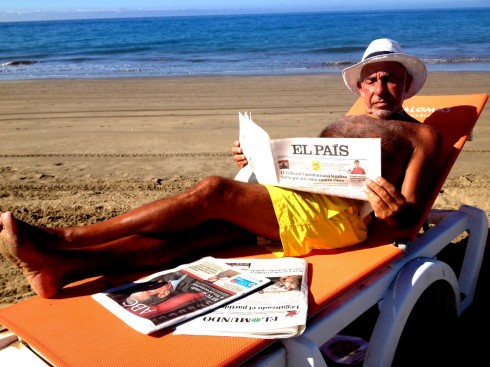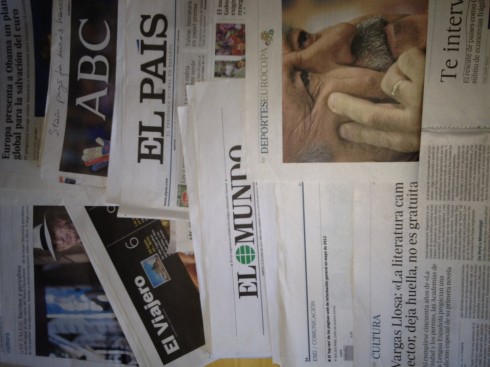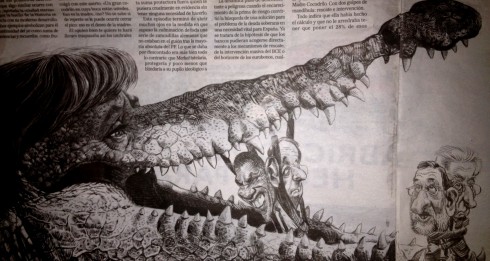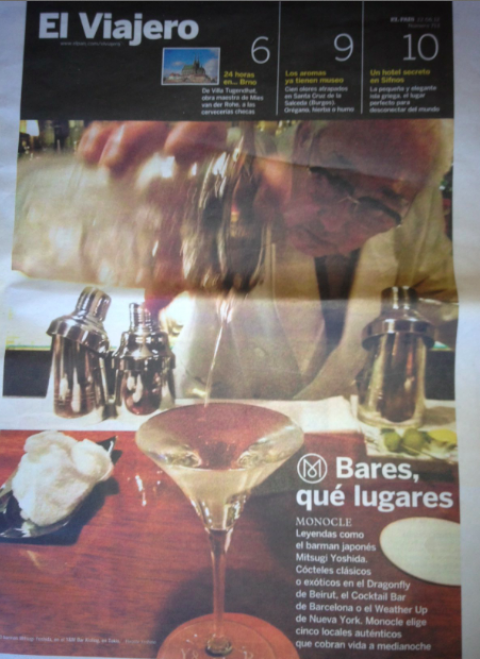Update 1: Frankfurt, Sunday, June 24, 00:16
TAKEAWAY: We are back after a few days in the sun in the beautiful Canary Islands. For ten days, hardly any of my usual daily digital ritual connections, and total submersion into the three national Spanish newspapers. Here are reflections on my semi disconnect. Spain may have a grave financial crisis, but its newspapers are rich with great content and the type of journalism that has disappeared from so many newsrooms. Bravo!
Thoughts while lying by the beach in the Canaries

Photo by Frank Deville
The Canary Islands is the home of my maternal ancestors, and I always feel as if I truly belong here when I make my annual summer pilgrimage to Las Palmas. After two days, the sound of the Spanish spoken here (with the familiar cadence of our Cuban Spanish), the food (those green Pimientos de Padron are on my plate nightly), the warmth of the people, transport me to the Suarez side of my family, who went from the little island with the great beaches and black sand, La Gomera, to Cuba.
Of course, many of the Suarezes I meet here immediately tell me that “perhaps we are cousins”. If that is the case, I have more cousins than I could possibly get to know in a lifetime.
But visiting here this early summer of 2012 has been quite different.
This is NOT a happy Spain——except with their football victories during the European Fooball Cup 2012 , where they score goals and smell the scent of victory. That La Roja team is the pride of Spain! Olé, Olé, Olé ! They also celebrate those great boys of summer and every season: Rafa Nadal and Fernando Alonso.
“Our athletes,” writes a sports columnist, “are keeping us from going totally insane with bad economic news of our never ending crisis.”
There is no victory elsewhere and especially not in the economy, which is the main topic of all the newspapers, usually under labels with the word “crisis” in them. I counted from 10-12 pages devoted to “La Crisis” daily in each of the national dailies.
The national press

Everyday I stop at Bazaar Coral to get me printed editions of El Pais, ABC and El Mundo , the three main national Spanish newspapers, all of which carry Canary Island editions ( a few pages devoted to local news).
The rest is very detailed, analytical and excellent coverage of the European economic crisis, with emphasis on Greece and Italy, and comparisons of those countries and Spain’s own situation.
While the Spanish people are living through one of their most difficult economic times in recent history, the national newspapers are rich—-a national treasure—-with great content, fantastic opinion pieces, and well designed graphics to explain it all.
I must admit that a lot of the coverage is devoted to the financial crisis. For one thing, I have been away from US politics and our own Presidential elections only five months away. My hotel here does not have CNN (so BBC it is for me, with much less coverage of the US than I had anticipated). The European crisis is such magnitude, that the US election is barely a beep on the radar of the editors here.
It is all about “la crisis”

El Mundo, Sunday, June 24, illustration by Ricardo
Because the newspapers I am reading are published in Spain, you do get an overabundance of articles dealing with the WHY things got to the point where they are, and, obviously, Angela Markel , the German chancellor, is not the most favorite character, especially for editorial cartoonists who draw her as a dominatrix, whip in hand, asking the rest of the southern Europeans to “get to work, bite the bullet and get with the program.” Every part of the newspaper is covered from the “crisis” vantage point.
There are no bouquets of roses for the Germans in these parts, with columnists reminding them that “we in the southern European countries are not all lazy bums who sleep siestas, drink sangria and work as little as possible.”
But, the prize for the most visual representation of Chancellor Angela Markel at her worst goes to El Mundo (Sunday, June 24): in a two-page commentary signed by the newspaper’s editor in chief, Pedro J. Ramirez, we see a huge cartoon of Frau Markel as an alligator with a giant jaw, while Obama, and three European leaders try to wrestle with what the headline describes as Mama Alligator! (The cartoon is signed by staff cartoonist Ricardo)
In what may appear as a tit for tat, the Sunday June 24 edition of ABC carries a full report on the now famous delays in the opening of the new Berlin airport. The 90-point headline in red, loosely translated, reads: The Germans also do sloppy work.
Obviously, this type of story does not solve the crisis, but it could make those Sunday morning Spanish readers, waking up very happy with Saturday night’s football victory of Spain over France in the EuroCup 2012, just a little bit happier.
“Spain is punished”
One of my days in Spain, both El Pais and El Mundo used the word “punishment” (castigar) to refer to what they consider is happening to Spain in the hands of those other European countries deciding its financial fate.
Lifestyle articles are heavy with pieces on how to “look at life’s good moments” in the midst of the crisis, or how to cook with less (El Mundo recommends that you try El Panga, a Vietnamese fish that is cheap and tastes like chicken), entertain the kids for under 10 euros, and the usual dose of “avoiding depression in times of financial stress”. Sports accentuates the one area, the editors remind us, where Spain shines: from Nadal, to Alonso, to the national football team, El Rojo. Ah, and since it is all about life and death, there are tips for “your mother’s burial paid in 24 easy installments”
In El Mundo’s culture section of June 22: “Poems to read in times of uncertainty.”
Everyday I also find the hidden piece, written by someone highly nationalistic and optimistic, who reminds readers that “we are a great people, with a great history, and we will overcome”.
I believe it, and not just because of my Spanish ancestry.
The didactic role of newspapers
Perhaps I am not reading as many US and UK newspapers as I should, with the exception of The New York Times, to which I subscribe and read in whichever platform I have available—mostly digital. But I can say that the Spanish language newspapers, and this is true in South America as well, continue to take their didactic roles seriously.
The reason that I spend an average of 27-30 minutes with EACH of the three national newspapers here is because of the number of articles that may have little to do with the news of the day, but are so rich with analysis, commentary on a variety of topics that may not be at all in the readers’ navigator that day.
Some examples:
ABC: This newspaper in the slightly larger than A4 format and perfectly stapled (pages don’t fly away when the usual wind visits the beach here) offers a full page essay on its Page 3. Most of the time, it has NO reference to the lead story on page one, but digs deep into subjects such as the importance of religion on politics and science, or the importance of “a collective historic memory” in times of uncertainty. I found myself stopping to read this piece daily. In fact, now that I have gotten addicted, perhaps I will give ABC’s new tablet (and so far free) edition a try.
El Pais: The newspaper that calls itself the global newspaper in Spanish, and rightly so, has such an abundance of great columnists, that I know I looked at the sea less because I was totally immersed and transfixed with my reading. Isn’t this what good newspapers are supposed to do?
El Mundo: This is the one Spanish national newspaper with an attitude, and I like it, even if I may not agree with some of its causes. While ABC tends to be traditional, monarchic and formal (a dress it wears well), and El Pais takes itself as seriously as The New York Times (as it should be), El Mundo combines the best of those two other titles, but it wears tank top, Bermuda shorts and All Star high tops to go out. But, like the others, it considers its cultural and didactic role important. The June 22 edition carried a full page review of a new bilingual anthology of Emily Dickinson poems.
As you can see, Spain’s three national newspapers are like Spain itself: formal and serious, respectful of its royal family and its traditions, but also young and progressive.
MY almost total disconnect
And if you are wondering why I am not turning to my iPad for my New York Times daily update, well, I do, but with a very slow connection at the hotel, which works only in the lobby, I have decided that this was a good opportunity for a digital disconnect.
That much I have accomplished during my time here in the Canaries.
And, with the same speed with which I adapt to the wonderful Spanish banter and to my Canary Islands roots, I have also quickly switched to sitting under the beach umbrella with three printed newspapers.
A real vacation, if you ask me.
Of related interest: The Spanish newspapers
Monocle comes to El Pais

What a surprise to discover in the June 22 edition of El Pais that its travel section carries a full report from Tyler Brule’s Monocle Magazine , translated to the Spanish.
In this edition, with the Monocle logo rather prominently, a full report about the best bars in Japan, taken from the last issue of Monocle. Lots of happy El Pais readers, to get this treat.
The one Obama photo
Ten days here and finally, on June 20, El Pais carries one three column photo of a solemn looking President Obama, under the headline: Europe presents Obama with a global plan to save the euro.
In a short editorial June 21, El Pais also lauded President Obama’s decision to stop deporting young immigrants who study and work in the US. “Just because it is a political maneuver, let’s not grant less importance to Obama’s decision to allow young illegal immigrants to stay in the United States….”
The Euro and Spain
A page one headline in the June 19 ABC , and Spain’s prime rate continues to go up:
Spain paying for the euro’s harassment
Cuba in the news
I am happy to see that my mother country, Cuba, continues to make almost daily appearances in the Spanish press. In fact, there have been more references to Cuba than to the US in the past few days.
El Pais , June 20: lunch with Leonardo Padura , a Cuban novelist visiting Madrid, and his quotes, which I am surprised he would allow the reporter to publish, considering he would return to Cuba:
“Everytime I finish a new novel, I say to myself—”I am sure that this one will not be published in Cuba….but, eventually, they go ahead and publish it.”
Padura’s most popular novel, El hombre que amaba los perros (2009)—The man who loved dogs.
The British “not good neighbors”
If Germany is seen by many columnists and editorial writers in the Spanish press as the school principal with an attitude, the British are not far behind in the criticism they get.
ABC , June 20, in one of its Page 3 Essays, by Dario Valcarcel: “Today the great investors are Asians. In the Asia Pacific region they no longer publish newspapers in French, German and Spanish….English is the only European language. The United Kingdom wants to kill the Euro. But the United States doesn’t”.
Assorted articles paint the British as neighbors who live in the neighborhood, see their neighbors’ homes burning, but look at if from the safe periphery of their own home, and, in not only don’t do anything to put out the fire, but perhaps boycott efforts of others to do so.
Literature and culture
When Mario Vargas Llosa, the novelist and Nobel Prize in Literature winner, gave a lecture in Madrid, on the occasion of the 50th anniversary of his masterpiece, La Ciudad y los Perros (The City and the Dogs), all of the national newspapers devoted two full open pages to the occasion.
Vargas Llosa’s main pronouncement:
“Literature changes the reader, it leaves an imprint, it is not free….A society impregnated with a good literature is more free.”
How the Spanish read news online
Perhaps because its numbers are the best, El Mundo devoted almost a full page to a graphic and story about how “El Mundo.es dominates the Internet.”
Indeed, it does. According to Nielsen figures, El Mundo.es claims 5,973,000 unique readers, compared to 4,742,000 for El Pais.es and 3,669,000 for ABC.es
Hable inglés?
In what constituted a bit of “bad news” for the Spanish, a recent study of how well students who complete high school in Europe know a foreign language—especially English—-the Spanish students ranked at the bottom of the list, with 63% of high school seniors having difficulties to understand spoken English.
In case you wonder, Sweden ranked number one. No surprise here for me.
And, in fact, France ranked under Spain.
The UK ranked last in Europe in the ability of its last year high school students to comprehend a second language.
The iPad Design Lab: Storytelling in the Age of the Tablet

Video walkthrough of the iPad prototype of iPad Design Lab